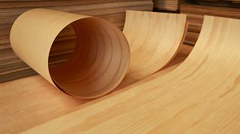South Korea extends anti-dumping duties on Malaysian plywood for another five years
20/10/2020 12:00

South Korea’s Trade Commission has made a preliminary decision to extend the anti-dumping duties on Malaysian plywood for another five years.
The commission, which comes under South Korea’s Ministry of Trade, Industry and Energy, has concluded that if the existing tariff barriers are eliminated, the Malaysian plywood could be dumped into the local market, thus hurting the Korean plywood industry.
With the decision, South Korea will slap anti-dumping tariffs on Malaysian plywood from 4.73% to 38.1%.
The trade commission has notified the Finance Ministry of its decision and the latter will make the final decision next month (November), according to Korea’s Yonhap News Agency.
The trade commission has also decided to extend similar anti-dumping duties on plywood from China for five years (from 3.98% to 27.21%), and it had early this year decided to impose tariffs on Vietnamese plywood, which took up 40% of the Korean market.
South Korea first imposed three-year anti-dumping duties on Malaysian and Chinese plywood in 2011 and 2013, and the duties have been extended upon every expiry period.
In 2011, the duties levied on Malaysian plywood ranged from 5.12% to 38.1%, affecting eight major Sarawak plywood manufacturers and exporters and one supplier in Sabah.
The affected Sarawak exporters, which paid between 5.12% and 9.75%, were Jaya Tiasa Timber Products Sdn Bhd, Subur Tiasa Plywood Sdn Bhd, Hwa Seng Veneer and Plywood Industry Sdn Bhd, Shin Yang Plywood Sdn Bhd, Forescom Plywood Bhd, Menawan Wood Sdn Bhd, Shin Yang Plywood Bintulu Sdn Bhd and Zedtee Plywood Sdn Bhd. Sabah-based Sinora Sdn Bhd paid the highest duties of 38.1% while all other Malaysian suppliers paid 8.76%.
The duties were imposed on plywood products of at least 6mm in thickness.Products below that thickness are spared of the duties.
Sarawak’s plywood exports to South Korea, the traditional key market, has been hit following the imposition of the duties.
In 2009, Sarawak shipped more than 530,000 cubic meters (cu m) worth RM570mil to South Korea and this declined to 86,451 cu m valued at RM92.4mil (free on board value) in 2019.
Latest figures from the Sarawak Timber Industry Development Corp (STIDC) revealed that South Korea imported 58,594 cu m of plywood products worth about RM98mil from Sarawak in the first nine months of 2020, and it ranked fourth as the single biggest overseas market for Sarawak plywood.
According to the International Tropical Timber Organisation (ITTO), South Korean plywood imports reached US$391mil in the first six months of 2020. Indonesian plywood gained a firm market share in the South Korean market, accounting for US$133mil followed by Vietnam plywood (US$127mil) in the first half of 2020.
In 2018, the South Korean plywood market had a size of US$737mil.
ITTO said the South Korean regulatory authority has issued anti-dumping duties of up to 10.65% for five years on certain Vietnamese plywood producers, and the final decision from the South Korean Finance Minister is expected by end of this year.
During the January-September 2020 period, Sarawak exported 765,798 cu m of panel products worth nearly RM1.49bil, with about 64% or 487,289 cu m worth RM1.02bil going to Japan. Yemen and Taiwan were the second and third largest buyers, paying RM126.6mil and RM104.7mil respectively for their imports from Sarawak.
Due to the weak demand and soft prices, most Sarawak plywood manufacturers have drastically cut their production volumes in the past two to three years. Sarawak has lost its market share in Japan to the Indonesian plywood suppliers on competitive product pricing and the growing Japanese softwood plywood market.
“The export market has been sluggish due to weak demand. We halted production in one of our plywood mills in August 2020 to further cut production, ” a senior executive of one of the Sarawak’s leading plywood manufacturers told StarBiz.
He said the mill now concentrates on the production of veneer for internal supply to the group’s other plywood factories.
WTK Holdings Bhd has also scaled down its plywood manufacturing activities, with production volume cut to 125,000 cu m in 2019 from 177,000 cu m in 2018. The company’s plywood sales volume dipped to 111,000 cu m from 174,000 cu m year-on-year, with Japan as its key buyer.
WTK said in its 2019 annual report that it would continue to curtail production if the demand stayed weak.
Jaya Tiasa Holdings Bhd also reported sharply lower plywood sales, which fell 39% to 47,340 cu m in 2019 from 72,164 cu m in 2018.
“The downsizing of our plywood manufacturing facility was in response to market conditions and limited timber resources. The market for plywood has been challenging ever since the economic downturn.
“To maximise our revenue and to retain our existing markets, we have maintained our strategy in producing a more high-value product mix, ” said Jaya Tiasa, which exports 35% of its panel products to Japan and the balance to several countries, including South Korea, Japan and China.
The commission, which comes under South Korea’s Ministry of Trade, Industry and Energy, has concluded that if the existing tariff barriers are eliminated, the Malaysian plywood could be dumped into the local market, thus hurting the Korean plywood industry.
With the decision, South Korea will slap anti-dumping tariffs on Malaysian plywood from 4.73% to 38.1%.
The trade commission has notified the Finance Ministry of its decision and the latter will make the final decision next month (November), according to Korea’s Yonhap News Agency.
The trade commission has also decided to extend similar anti-dumping duties on plywood from China for five years (from 3.98% to 27.21%), and it had early this year decided to impose tariffs on Vietnamese plywood, which took up 40% of the Korean market.
South Korea first imposed three-year anti-dumping duties on Malaysian and Chinese plywood in 2011 and 2013, and the duties have been extended upon every expiry period.
In 2011, the duties levied on Malaysian plywood ranged from 5.12% to 38.1%, affecting eight major Sarawak plywood manufacturers and exporters and one supplier in Sabah.
The affected Sarawak exporters, which paid between 5.12% and 9.75%, were Jaya Tiasa Timber Products Sdn Bhd, Subur Tiasa Plywood Sdn Bhd, Hwa Seng Veneer and Plywood Industry Sdn Bhd, Shin Yang Plywood Sdn Bhd, Forescom Plywood Bhd, Menawan Wood Sdn Bhd, Shin Yang Plywood Bintulu Sdn Bhd and Zedtee Plywood Sdn Bhd. Sabah-based Sinora Sdn Bhd paid the highest duties of 38.1% while all other Malaysian suppliers paid 8.76%.
The duties were imposed on plywood products of at least 6mm in thickness.Products below that thickness are spared of the duties.
Sarawak’s plywood exports to South Korea, the traditional key market, has been hit following the imposition of the duties.
In 2009, Sarawak shipped more than 530,000 cubic meters (cu m) worth RM570mil to South Korea and this declined to 86,451 cu m valued at RM92.4mil (free on board value) in 2019.
Latest figures from the Sarawak Timber Industry Development Corp (STIDC) revealed that South Korea imported 58,594 cu m of plywood products worth about RM98mil from Sarawak in the first nine months of 2020, and it ranked fourth as the single biggest overseas market for Sarawak plywood.
According to the International Tropical Timber Organisation (ITTO), South Korean plywood imports reached US$391mil in the first six months of 2020. Indonesian plywood gained a firm market share in the South Korean market, accounting for US$133mil followed by Vietnam plywood (US$127mil) in the first half of 2020.
In 2018, the South Korean plywood market had a size of US$737mil.
ITTO said the South Korean regulatory authority has issued anti-dumping duties of up to 10.65% for five years on certain Vietnamese plywood producers, and the final decision from the South Korean Finance Minister is expected by end of this year.
During the January-September 2020 period, Sarawak exported 765,798 cu m of panel products worth nearly RM1.49bil, with about 64% or 487,289 cu m worth RM1.02bil going to Japan. Yemen and Taiwan were the second and third largest buyers, paying RM126.6mil and RM104.7mil respectively for their imports from Sarawak.
Due to the weak demand and soft prices, most Sarawak plywood manufacturers have drastically cut their production volumes in the past two to three years. Sarawak has lost its market share in Japan to the Indonesian plywood suppliers on competitive product pricing and the growing Japanese softwood plywood market.
“The export market has been sluggish due to weak demand. We halted production in one of our plywood mills in August 2020 to further cut production, ” a senior executive of one of the Sarawak’s leading plywood manufacturers told StarBiz.
He said the mill now concentrates on the production of veneer for internal supply to the group’s other plywood factories.
WTK Holdings Bhd has also scaled down its plywood manufacturing activities, with production volume cut to 125,000 cu m in 2019 from 177,000 cu m in 2018. The company’s plywood sales volume dipped to 111,000 cu m from 174,000 cu m year-on-year, with Japan as its key buyer.
WTK said in its 2019 annual report that it would continue to curtail production if the demand stayed weak.
Jaya Tiasa Holdings Bhd also reported sharply lower plywood sales, which fell 39% to 47,340 cu m in 2019 from 72,164 cu m in 2018.
“The downsizing of our plywood manufacturing facility was in response to market conditions and limited timber resources. The market for plywood has been challenging ever since the economic downturn.
“To maximise our revenue and to retain our existing markets, we have maintained our strategy in producing a more high-value product mix, ” said Jaya Tiasa, which exports 35% of its panel products to Japan and the balance to several countries, including South Korea, Japan and China.
Source: The Star
Các tin khác
- More efforts needed to maintain export growth to China: Insiders (24/04/2024)
- Shadow trade minister calls for greater focus on removal of Chinese trade barriers (24/04/2024)
- New U.S. Solar Panel Tariff Intensifies Sino-American Green Tech War (24/04/2024)
- It is expected that there are higher orders and revenue in the second quarter from European businesses (24/04/2024)
- U.S. Ceramic Manufacturers Seeking Tariffs Against Indian Import (24/04/2024)
 Home
Home
 About Us
About Us




















